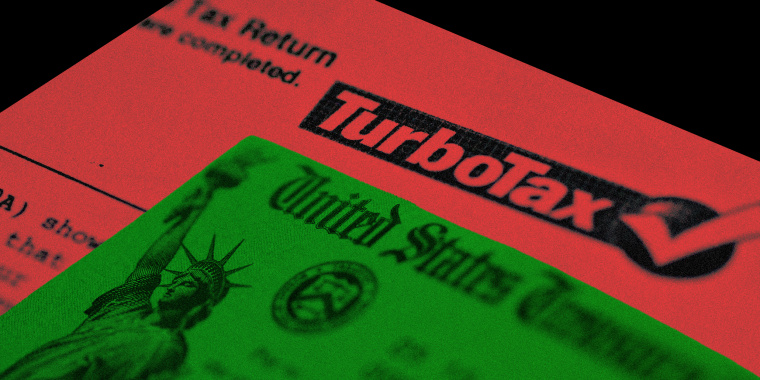This year, because of the pandemic, the IRS bumped the tax filing deadline from the traditional April 15 to May 17. But that extra month doesn't change the fact that even the simplest version of federal tax forms can feel overwhelming to people trying to go it alone.
It's no wonder that a 2013 Pew Research survey found that over half of the country really dislikes — or outright hates — doing their taxes. And one of the biggest reasons the shared annual hell that is Tax Day persists in its current form comes down to two giant companies that profit off our misery.
That number would probably change if the U.S. followed the lead of several European countries and moved to a "return-free filing" system. In these countries, there's no need to prepare your taxes from scratch, surrounded by W-2s and 1099s and receipts and other various slips of paper you aren't sure are important but might save you a few dollars.
In countries like Denmark and Spain, the government uses basic information to calculate what you owe, sends you a form and leaves it up to you to make any corrections before the deadline. In others, like the U.K. and Germany, the government uses its knowledge of how much it has withheld to either withhold the exact amount owed for the rest of the year or to siphon off more — or less — of your paycheck at the end of the year to adjust your taxes.
So why can't that system work in the U.S.? Given how complicated the tax code is after years of its having been used to provide social benefits, it certainly would be difficult to implement — but not impossible. But the main reason we're still fantasizing about this system after politicians as far apart as Ronald Reagan and Barack Obama endorsed it is the software you may have used to prepare your taxes this year.
It has been almost a decade since ProPublica reported that Intuit — the company that produces TurboTax — spent millions on lobbying the government to keep the IRS from preparing your taxes for you. That money had gone toward efforts to kill two bills that would have "allowed many taxpayers to file pre-filled returns for free."
In 2019, ProPublica revealed that the lobbying effort was even broader than originally thought. For two decades, Intuit has waged "a sophisticated, sometimes covert war to prevent the government" from simplifying the tax preparation process — and it has been very proud of the results:
Internal presentations lay out company tactics for fighting “encroachment,” Intuit’s catchall term for any government initiative to make filing taxes easier — such as creating a free government filing system or pre-filling people’s returns with payroll or other data the IRS already has. “For a decade proposals have sought to create IRS tax software or a ReturnFree Tax System; All were stopped,” reads a confidential 2007 PowerPoint presentation from an Intuit board of directors meeting. The company’s 2014-15 plan included manufacturing “3rd-party grass roots” support. “Buy ads for op-eds/editorials/stories in African American and Latino media,” one internal PowerPoint slide states.
If that's not bad enough, back in 2003, the IRS agreed not to make its own free tax filing software in exchange for Intuit's, H&R Block's and other companies' offering free tax prep to millions of low-income Americans. ProPublica reported in 2019 that the companies then went out of their way to hide references to the Free File program in favor of steering taxpayers to the paid versions of their programs. They even went as far as to make sure the Free File page was hidden from Google searches, preferring to trick consumers into starting what they thought were free files but hitting them with charges late in the process.
Well, thankfully, the IRS has had enough of those shenanigans, and it changed the terms of its agreement with the tax preparation companies in December 2019. After all those millions of dollars were spent to prevent such a thing, the IRS declared that it could produce its own filing software if it chose to. And as of last year, the Federal Trade Commission was busy investigating whether Intuit violated the law with its misleading ads diverting customers from free filing options.
That's all great. But in the few weeks before tax returns are due, Americans will still stress over whether they checked the wrong box and whether that means they owe thousands of dollars.
Now, in my opinion, would be the perfect time for Treasury Secretary Janet Yellen to go all in against these companies and come out in favor of return-free filing. At the very least, let's get a feasibility study — or, better, a pilot program — to see whether there's a way to dig taxpayers out from under the pile of paperwork it takes to say that yes, you took my money this year.

